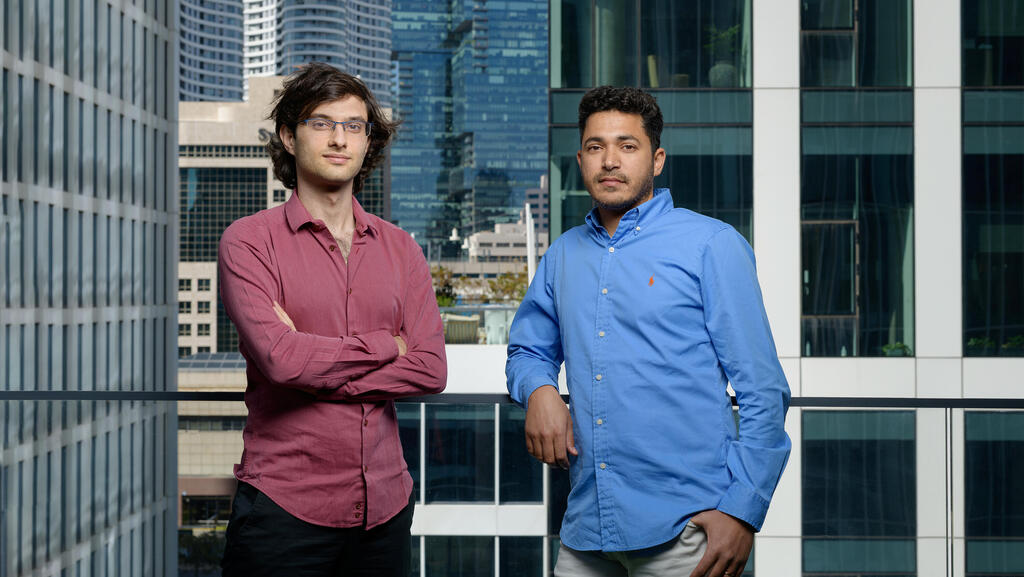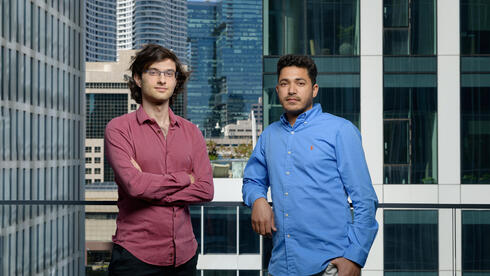
Most Promising Startups - 2025
Inside Decart: The Israeli startup chasing AI greatness—one sleepless night at a time
They’ve built a game, beat ChatGPT’s launch record, and turned down offers at billion-dollar valuations. This is the company topping Calcalist’s 50 most promising startups list for 2025.
On one of the walls in the hallway of Decart's Tel Aviv offices hangs a blurry photograph of a girl. Printed on an A4 sheet with a standard office printer, the photo might go unnoticed—except for its significance to Decart’s founders, Dean Leitersdorf and Moshe Shalev. For them, the girl in the photo, known only as Sarah, serves as a kind of red flag—a daily reminder of why they are building their startup.
See the full Top 50 Most Promising Startups 2025 list here
“Sarah is one of the world’s most elite and successful early-stage investors, with a strong track record in backing startups that became giants,” explain Leitersdorf and Shalev. “When we raised our Seed round in August, we spoke with ten funds. Half said, ‘This is amazing. I’ve never heard of anything like it. Take the money.’ The other half said, ‘We’re sure you’ll succeed technically, but we don’t understand what the final product is, so we’ll pass.’ Sarah was the only one who said she didn’t think we could even pull off the technology. She told us Israelis don’t know how to train models and that Israel has already missed the generative AI train. Her photo is on the wall as a reminder—we have to prove her wrong.”
The mission the two have set for themselves is, by their own admission, nothing short of revolutionary.
“When we founded Decart, we decided we wanted to solve a truly massive problem,” Leitersdorf says. “It took us a year to admit that this wasn’t going to be a two-year startup. It would take five years to build something that, when people look at the world before and after, there’s a real difference. Like the iPhone. Like Google Search. Like Facebook. Like nuclear weapons. Like the State of Israel. We said: let’s try to build a company like that. It’s ambitious, it’s risky, and there’s a good chance it won’t work—but once in a lifetime, you have to try.”
If anyone can attempt something that audacious, it’s probably them. While their origin story sounds familiar—“They met in Unit 8200”—the rest of it isn’t.
Leitersdorf, just 26, comes from a prominent Israeli financial family. His brother Yoav founded the successful venture fund YL Ventures. Dean himself has three degrees in computer science, including a PhD he completed at 23. His doctoral research earned him the prestigious ACM PODC Dissertation Award and led to a postdoc at the National University of Singapore. He began his undergraduate studies at 17, while waiting to be drafted into 8200, where he eventually met Shalev.
Shalev’s path could not have been more different. Born and raised in a Haredi household in Bnei Brak, he married young and worked in a butcher shop while studying accounting in evening classes. At 23, he took the rare step of enlisting in the IDF through “Bina Beyarok,” a program designed to integrate ultra-Orthodox men into military tech units. He served for 13 years in various roles within 8200, eventually becoming the right-hand man to then-unit commander Yossi Sariel. In 2017, while still in service, he co-founded the nonprofit StartAch with fellow unit alum Dor Saban, building software solutions for Israeli nonprofits.
The partnership between Shalev and Leitersdorf began somewhat accidentally, during a hallway conversation at their base shortly after Operation Guardian of the Walls in 2021. “Meeting Dean was pivotal,” Shalev recalls. “He had academic expertise, deep cyber and AI knowledge, but also knew how to think in terms of product. Everyone around him talked tech. He talked impact. It didn’t take long before we knew we were going to build something together.”
The age and personality gap between Leitersdorf and Shalev is evident at every turn. Leitersdorf is the technologist, charging ahead with vision, while Shalev, with a more grounded business mindset, keeps him tethered to reality. “We’re both strong executors, but we dream differently,” Shalev says of their dynamic. “Each of us brings something distinct. It’s the meeting point between Dean’s ability to imagine technology on a broad scale and my ability to bring it into an organization and operationalize it. I like to work fast—and we push to accelerate even more each time.”
So far, the approach is working. Even if “Sarah” (the investor whose rejection hangs on their wall) didn’t believe in them, others have. Just a year and a half since founding Decart, the duo has already raised $53 million across two rounds, just months apart. The Seed round in August 2024 brought in $21 million and was led by Sequoia Capital. The second round, in November, valued the company at half a billion dollars and was led by Benchmark. In fact, Sequoia’s decision to reopen its Israeli office during the war is widely attributed to its investments in Decart and Kela—two wartime startups now seen as among the fund’s most promising bets.
But is this ambition realistic? After all, Israel has produced many tech successes, but never a company on the scale of Google or Facebook. Can an Israeli company really lead the global AI wave?
“When people ask me that—and many do, including our employees—I answer like a good Jew: with a question,” Leitersdorf laughs. “Do we have any choice but to try? This country has always closed the gap against all odds. At first, nothing works, but then it does. We're not modest in our ambitions, because if you don't try, you can't succeed. Most of the projects we worked on at Unit 8200 failed. But the three that succeeded? They fundamentally changed how intelligence is done. Don’t fear failure—fear not trying.”
Decart’s beginnings weren’t smooth. The company was officially registered on September 7, 2023. A month later, both founders were called up for reserve duty and remained there for months. At the time, they had only a broad vision: to build something revolutionary in generative AI. “A month after I started my postdoc in Singapore, ChatGPT came out, and it changed everything,” says Leitersdorf. “Moshe and I realized we couldn’t wait. Even while I was in Singapore, we started recruiting top researchers.”
What exactly got investors so excited—enough to hand over $50M and assign a half-billion-dollar valuation in under a year?
“We had a lot of ideas,” says Shalev. “But nothing made us proud. So we came up with a test: What would the Wikipedia page say about us in the future? What problem did we solve? Until we could answer that, we weren’t satisfied.”
Then came the breakthrough: a product that increased the efficiency of Nvidia chips. It attracted a multimillion-dollar customer by December 2023 and started generating real revenue. “Everyone told us to keep going in that direction,” says Shalev. “It was tempting, especially with the money coming in. But it wasn’t it. It wasn’t the big thing.”
Then came Oasis. A demo of a game that generates video in real-time. On the surface, it looked like Minecraft. But unlike traditional games, every keystroke created a completely new reality. Within three days of release, Oasis surpassed ChatGPT’s launch record, hitting one million users. Elon Musk even tweeted a simple “wow” after seeing it.
But perhaps the biggest flex? The servers didn’t crash. And they didn’t bankrupt the company. While most video generation tools cost around $100 per hour, Decart did it for just 25 cents. Oasis remains live and free—but it’s not the endgame. It’s more of a reconnaissance mission to understand what users actually want from AI, so Decart can build the product that delivers it.
Related articles:
And what is that product? What’s next?
“Think about how fast things change with ChatGPT,” says Leitersdorf. “Two weeks ago, my dad asked it about Trump’s tariffs and got a coherent explanation. Two years ago, we wouldn’t dream of having a back-and-forth conversation with an AI. Now it’s normal. But today’s ChatGPT isn’t what consumers will keep on their phones long-term. Something new is coming—an experience that will make the current one look primitive. We think that will emerge in 2025 or 2026. And we want to be the ones who bring it.”
How do employees handle the ambiguity and pressure?
“The magic lies entirely in the people,” says Shalev. “We only hire those who can thrive in uncertainty and are also top-tier engineers.” Leitersdorf adds, “Ten years ago, I heard Steve Jobs’ Stanford speech. He talked about building without a playbook—connecting dots only visible in hindsight. That’s what we’re doing. Even Wiz didn’t follow a cyber playbook. They tore it up and went further than anyone.”
At Decart, everything changes—except three things. Every employee gets these principles in writing when they sign:
- We are here to build a company with a billion users. There are fewer than ten in history.
- We’ll do it by building one of the deepest AI labs in the world. Only OpenAI, Anthropic, Google, Meta, xAI, and China’s DeepSeek operate at this level.
- We’re doing it in Israel, with the craziest talent around—algorithmic, engineering, and research. It all comes together here, and Israel must be at the forefront of the AI superpower race.
And what about the pressure—from investors, from expectations?
“There are many sleepless nights,” says Leitersdorf. “We wake up at 3 a.m. second-guessing decisions. But we’re in it together. We’ve already turned down funding offers at billion-dollar valuations. One of the world’s top investors told me recently, ‘All the strongest teams in Silicon Valley came through our doors last year. But you two were the only ones who said you want to build a before-and-after company.’”
Company ID
Sector: AI
Established: 2023
Founders: Dr. Dean Leitersdorf and Moshe Shalev
Employees: 50
Funding: $53 million from Sequoia, Benchmark, Zeev Ventures
